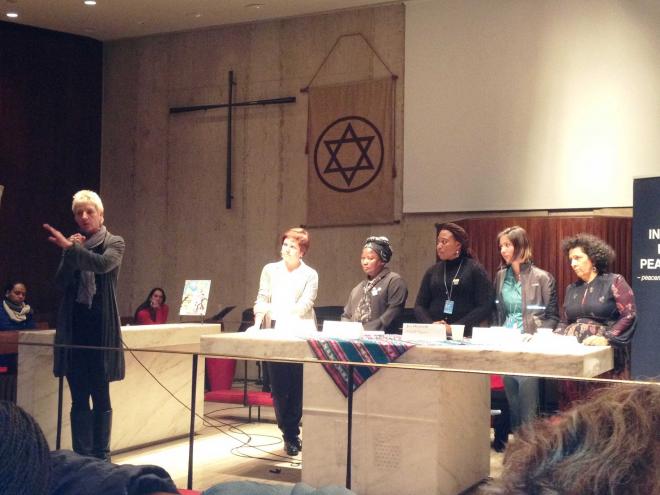UN’s 57th Commission on the Status of Women Recap
Published on April, 06 2013
By Abigail E. Ruane, WILPF-US Representative to the United Nations and PeaceWomen Program Consultant
As part of an over 70 person delegation from 25 countries, WILPF brought six Local2Global and 15 Practicum in Advocacy participants to the 57th United Nations (UN) Commission on the Status of Women (CSW) in New York this March, where the focus was the elimination of violence against women and girls. Participants connected and strategized at a Saturday orientation with Petra Totterman-Andorff and Maria Butler from the WILPF UN Office, and Practicum students coordinated at a Sunday dinner with Abigail Ruane, WILPF-US Representative to the UN. WILPFers then worked to bring attention from civil society and governments to the root causes of violence in gendered power inequalities and militarization. As Rita Jankowska-Bradley and Melissa Torres of WILPF-US demanded at their March 5 panel, when it comes to violenced against women and girls, we must take action to guarantee “¡Ni Una Mas! Not one more!”
In reflecting on her experience, Practicum student Ashley Schumueker writes that her experiences at CSW have “ignited my passion for activism through performance, writing and film” by exposing her to powerful events and sharing personal experiences of women and girls with violence from around the world. At CSW 57, WILPF led the way in showing how building on diverse voices is key to building a world of peace and freedom. At WILPF events such as the March 5th panel on “The Lethal Consequences of Arms,” WILPF’s diversity – with members from Costa Rica to the Democratic Republic of the Congo, to the United States – enabled a wide and deep consideration of the personal impact of the politics of militarization inequality. This richness was also evident in Practicum reflections about CSW experiences on the WILPF-US Discussion Board, which included deeply thoughtful considerations of how to have solidarity with feminist allies while still being critical and attentive to continued forms of exclusion. The importance of intergenerational diversity was emphasized by the engagement of Local to Global (L2G) participants and Practicum students, and the L2G visit of WILPF’s incredible archives at the New York Public Library.
Amazingly enough, the importance of diversity also came up this year in governmental discussions. After a Nigerian governmental representative told a March 7th governmental panel that “I am a woman with a disability” and critiqued the absence of attention to disability in the original draft text, the final agreed conclusions did end up stating that governments should take “all appropriate legislative, administrative, social, educational and other measures to protect and promote the rights of women and girls with disabilities.” All of these instances reinforced the power of diversity and voice in creating strong vision and mechanisms for peace and freedom in our world.
After two packed weeks, governments came very close to failing to agree on an outcome document for a second straight year. There was strong pushback from the “Unholy Alliance” led by Iran, Rusia, Syria and the Vatican, and Libian Grand Mufti Sheikh Sadeq Al-Ghariani issued a fatwa against CSW agreed conclusions as undermining the structure and integrity of the family – before they were even finalized! Despite this, advocates stayed strong, and governments finally agreed, and even included an 11th hour recognition that “illicit use of and illicit trade in small arms and light weapons aggravates violence, inter alia, against women and girls.” WILPF advocacy strongly supported this language, and continued to make this link at the Arms Trade Treaty negotiations occurring immediately after CSW, where WILPF advocated for a strong agreement with legally binding gender provisions. At the Friday lunch of the 100th anniversary campaign, WILPFers celebrated the last century of advocacy for peace and freedom, and prepared to unleash the power of women to end war in the next.
Now that those of us who attended CSW have returned home and caught up on a little sleep, we have to ask ourselves: where do we go from here? If agreements are to be meaningful in the lives of women and girls, all of us must build on our strengths and link our advocacy at the local, national, and regional levels. CSW is just one part of a much bigger picture, and we need all of us to change the world. As practicum student Catherine Odera writes, “Now that I am back in Georgia, the challenge has been placed before me to seek ways to be courageous enough to walk on the road less travelled through activism and advocacy.”
To strengthen interconnections between the local and international levels, WILPF International has asked CSW participants to brief their local branches within the next month. You can help by checking out the PeaceWomen’s CSW57 overview, supporting CSW participants in debriefing, and posting photos and descriptions of any events to the WILPF-US Facebook page. You can also pass on updates to me (abigail@peacewomen.org) if you would like to share event information with PeaceWomen and WILPF International.
Thanks to all of you for the work that you do to create greater peace and freedom! I am grateful for WILPF’s rich resources and look forward to moving forward together.
Image credit: Madeleine Rees, WILPF Secretary General; Josephine Karlsson (WILPF Sweden); Annie Matundu (WILPF DRC); Joy Onyesoh (WILPF Nigeria); Nina Ferrer (WILPF Columbia); and Adilia Caravaca (WILPF Costa Rica and President, WILPF International) at the March 5th "Violence Against Women: the Lethal Consequences of Arms" WILPF event in the Church Center



